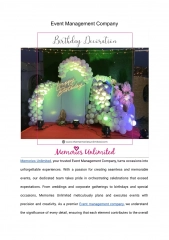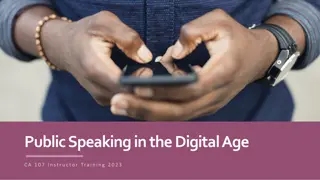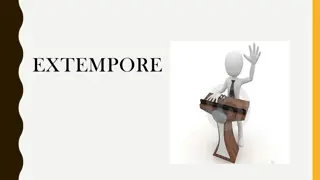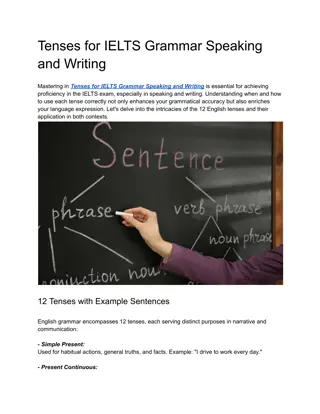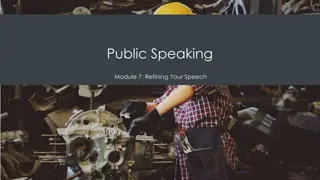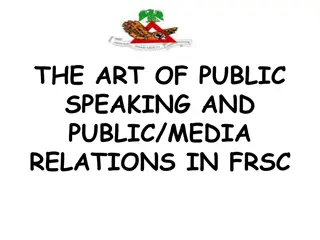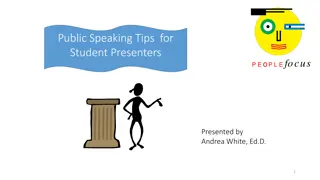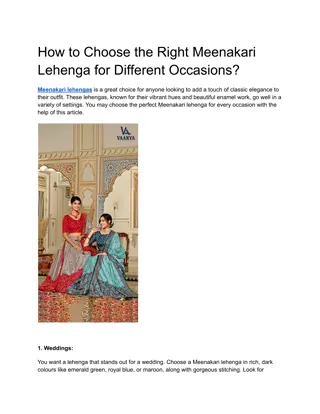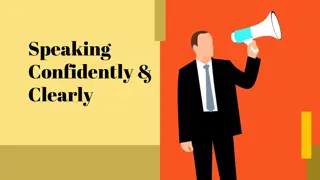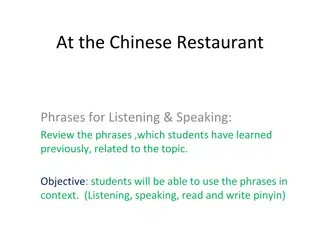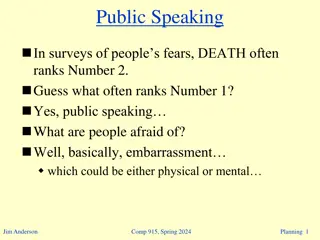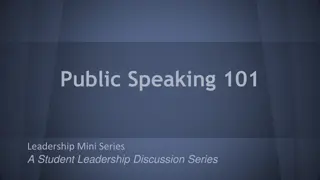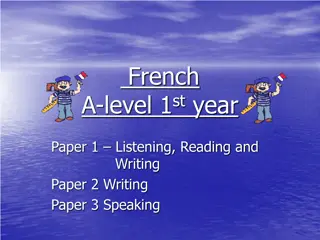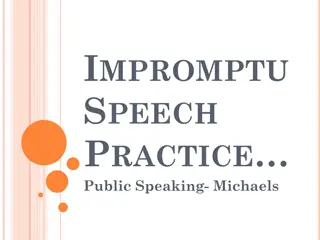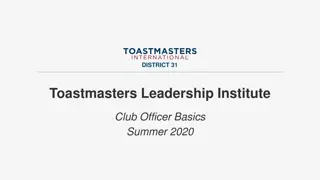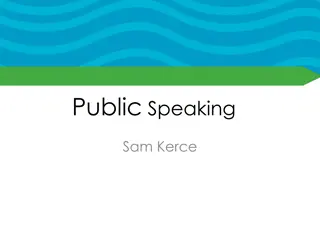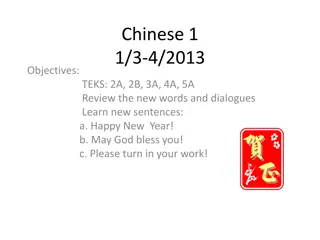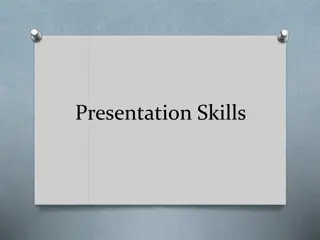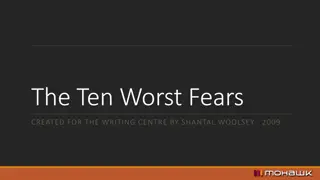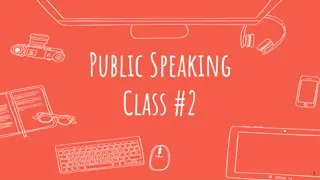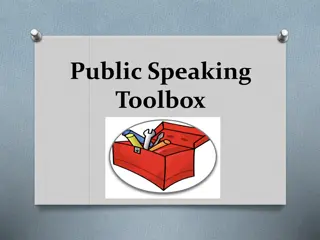Mastering Public Speaking for Special Occasions
Explore the art of speaking to entertain and for special occasions, learning how to adapt your speech, use language effectively, incorporate humor appropriately, and engage your audience. Dive into techniques for preparing and delivering speeches for toasts, roasts, eulogies, and more, along with understanding the speech requirements of various events. Enhance your public speaking skills and make a lasting impact on your audience in any special occasion.
Download Presentation

Please find below an Image/Link to download the presentation.
The content on the website is provided AS IS for your information and personal use only. It may not be sold, licensed, or shared on other websites without obtaining consent from the author.If you encounter any issues during the download, it is possible that the publisher has removed the file from their server.
You are allowed to download the files provided on this website for personal or commercial use, subject to the condition that they are used lawfully. All files are the property of their respective owners.
The content on the website is provided AS IS for your information and personal use only. It may not be sold, licensed, or shared on other websites without obtaining consent from the author.
E N D
Presentation Transcript
Public Speaking Module 11: Speaking to Entertain and for Special Occasions
Module Learning Outcomes Explain how to prepare and deliver a speech for a special occasion 11.1: Recognize the speech requirements of a special occasion 11.2: Explain how to prepare and deliver a toast, roast, or eulogy 11.3: Explain different speaking roles at awards ceremonies and other events
Learning Outcomes: Speech Requirements of Special Occasions 11.1: Recognize the speech requirements of special occasions 11.1.1: Explain how to adapt speech skills to different occasions 11.1.2: Identify appropriate language effects for different situations 11.1.3: Identify approaches to humor in public speaking 11.1.4: Identify when humor may or may not be appropriate for the occasion 11.1.5: Identify the proper techniques for delivering a speech on a special occasion
Adapting your Speech for the Occasion Understand the audience and occasion by asking the 5 Why s (and 1 How) Audience Analysis Ask WHO? Is the speech about? Else is speaking? Invited me to speak? Tone for the speech Ask What? Is the reason for the occasion? Is the goal of my speech? Scope & length of speech Ask When? Is the occasion? Will I speak during the program? Plan movement Ask Where? Is the location of the function? Build upon your credibility Ask Why? Have I been chosen to speak? Speaking Goal Ask How? Do I want this speech to be remembered?
Language Adaptation Use specific, vivid language Use ladder of abstraction to find the most specific or concrete words Use a cluster or word map to use specific examples Elevated Language for formal occasions Imagery Simile Metaphor Repetition Parallel structure Alliteration Animetabole Quotation
Humor When to use humor Use only after thorough audience and situational analysis Use humor sparingly Use only appropriate humor for the situation Poorly used humor hurts credibility Inappropriate target Inappropriate topic Inappropriate time Safest humor Self-deprecating Riskiest humor Sarcasm and Satire
Categories of Humor Irony The literal meaning is the opposite of the meaning that the speaker intends A joke based on the recognizability of certain character types References to experience that the listener can relate to The language or inappropriate nature of the joke surprises the listener Imitates a person or an idea in a funny way An exaggeration to the point of being absurd and funny Puns, double-meanings, and so on Comparing two things that don t seem to go together, yet somehow do Silly and often out of control Jokes about jokes Funny because the person is noticing the wrong thing Character Reference Shock Parody Hyperbole Wordplay Analogy Madcap Meta-humor Misplaced Focus
Preparing & Delivering a Special Occasion Speech Research Person, Organization, Audience that is related to the speech and purpose Know your Audience Adapt content, language, examples, and humor to be as inclusive as possible Write and Revise Begin with introducing yourself, do not need formal summaries and reviews Practice, practice, practice Practice in a variety of ways, get feedback, and practice how you will perform Voice and Delivery Practice in a mirror to see facial expressions, gestures, and eye contact Ask whether you will have a microphone to prepare Look Good. Feel Good Prepare outfit beforehand, get plenty of sleep and water, allow extra travel time
Practice Question 1 Jerry Seinfeld, with jokes like: I ll never understand why they cook on TV. I can t smell it. Can t eat it. Can t taste it. The end of the show they hold it up to the camera. Well, here it is. You can t have any. Thanks for watching. Goodbye. is known for using what type of humor? A. Irony B. Character C. Meta Humor D. Reference
Practice Question 2 If you want to adapt your speaking goal to the occasion, what question should you ask? A. Who is the speech about? B. What is the reason for the occasion? C. Why have I been asked to speak? D. How do I want this speech to be remembered?
Class Activity: JFK 1962 Moon Speech Read the manuscript or watch the speech of JFK s Moon Speech at Rice Stadium JFK 1962 Moon Speech - Rich Stadium Identify the following literary techniques: Imager Simile Metaphor Repetition Parallel structure Alliteration Antimetabole Quotation
Learning Outcomes: Toasts, Roasts, and Eulogies 11.2: Explain how to prepare and deliver a toast, roast, or eulogy 11.2.1: Identify characteristics of a toast 11.2.2: Identify characteristics of a roast 11.2.3: Identify characteristics of a eulogy
Toasts Keep it brief Focus on what the audience has in common Context Know who else is toasting Who you should honor: the host, the guests, the guest of honor, etc. Know traditions Content Begin by introducing yourself Body is the message and stories are your support/evidence End with a wish for the future Delivery Memorize or use a notecard, not a script. Do not read
Roasts A speech to honor someone using good-spirited ridicule End with a heartfelt honor toward honoree Type of Humor: Satire and Sarcasm Character humor Hyperbole Self-deprecating Prepare: Brainstorm traits or characteristics about the person Use those traits to poke fun of them Beware: Do not actually embarrass or humiliate Do not roast if you do not know the person well
Eulogy Speech to commemorate life and accomplishments of a deceased person Positive view of the deceased s life Remember the best of his or her personality or accomplishments Purpose: Uplift audience Celebrate feelings for the deceased person Delivery: manuscript or written beforehand
Practice Question 3 What type of humor is best used in Roasts? A. Self-deprecating B. Shock C. Meta Humor D. Madcap
Practice Question 4 Which type of speech should focus on the speaker? A. Toast B. Roast C. Eulogy D. None of these
Learning Outcomes: Speaking Roles 11.3: Explain different speaking roles at awards ceremonies and other events 11.3.1: Identify characteristics of an award speech 11.3.2: Identify characteristics of an acceptance speech 11.3.3: Identify effective ways to introduce a speaker 11.3.4: Identify effective ways to introduce and event 11.3.5: Demonstrate how to emcee an event
Award Presentation Presenting an Award An introduction to either an award or a winner Winner may be known or unknown before the speech Components Introduction: Brief introduction of yourself Thank the group or organization asking you to speak Body: Name and explanation of the award Explain what the winner accomplished to win Acknowledge nominees Conclusion: Announcement of winner
Acceptance Speech Purpose: Thank those who awarded or recognized you Names and/or Organization Acknowledge meaning of receiving the award Thank those who helped you to achieve the award Include names (or groups), roles, and effort Be generous with your praise and gratitude Prepare List of names/organizations/anecdotes to acknowledge and thank
Introducing a Speaker Goals: Focus the attention on the speaker Build up the speaker s credibility Generate curiosity and excitement about what the speaker will present DO: DON T: Stay In Your Lane Be Brief Set the Tone Speak to the Audience Start the Applause Welcome the Speaker to the Stage Wing It Use Jokes Use Clich s Speak to the Speaker Hog the Spotlight Leave before the speaker is on Stage
Master of Ceremonies (Emcee) Introducing an Event 1. Welcome and thank the audience for attending 2. Express thanks and appreciations to hosts 3. Explain the goals of the event and/or organization 4. Create excitement and anticipation for the event Throughout the Event 1. Know the Agenda 2. Keep your Energy High 3. Memorize Your Opening 4. Introduce other speakers using a fact about them 5. Always Communicate onstage or off 6. Interact with the Audience 7. Close with Inspiration
Practice Question 5 When introducing a speaker or an event, a goal of the speech is to: A. Entertain the audience B. Build your ethos through clever use of humor C. Be memorable D. Generate excitement and anticipation for the speaker or event
Class Activity: Present and Award and Accept it Break into pairs Create an award for something. Be sure to address the organization behind the award, what the award celebrates, how to win, etc. Decide who will win an award Decide who will accept the award The Presenter must present the award to the winner The Winner must accept the award and deliver an acceptance speech Take your time to prepare notes
Quick Review Special occasion speeches are often brief, use humor, and focus on someone or thing aside from the speaker When using humor in a special occasion speech, conduct a thorough audience analysis and ensure it is appropriate for the situation Elevated language through literary devices can lead to effective and memorable speeches Special Occasion Speeches include: Toasts Roasts Eulogies Award Presentations Acceptance Speeches Master of Ceremonies




